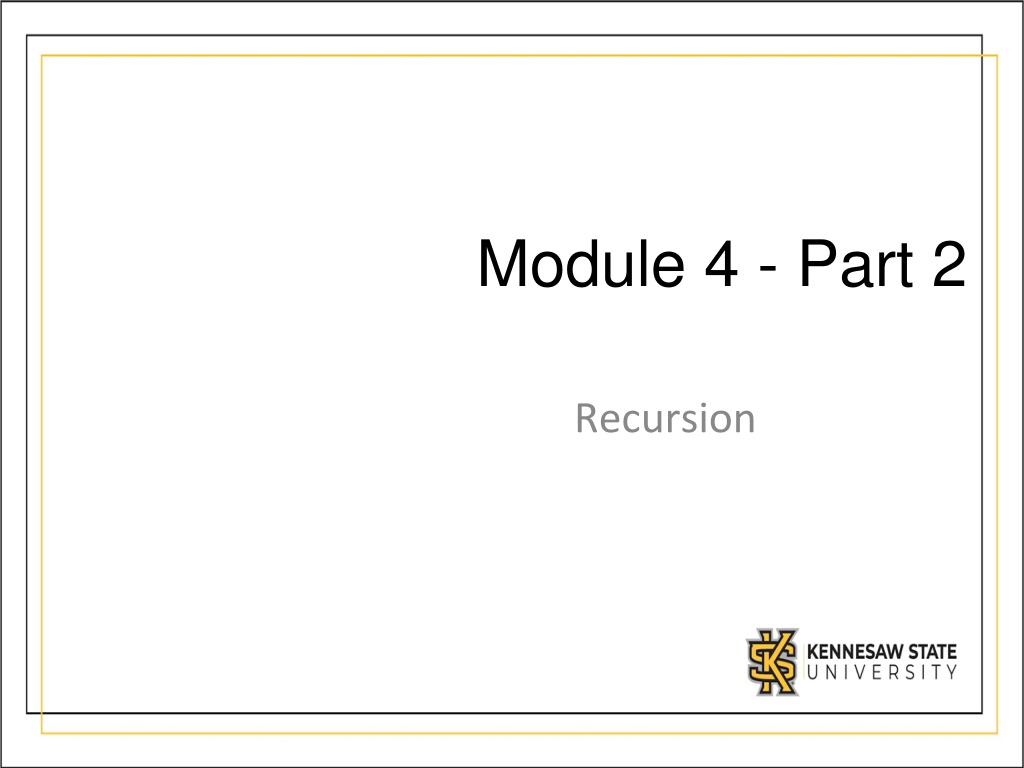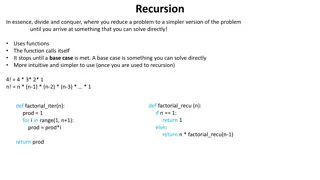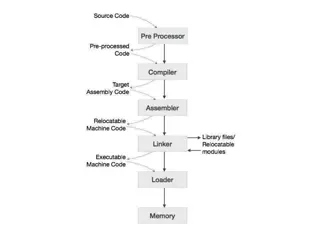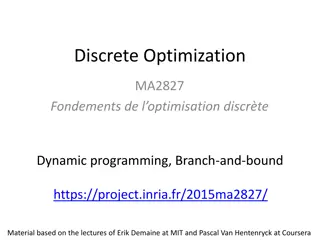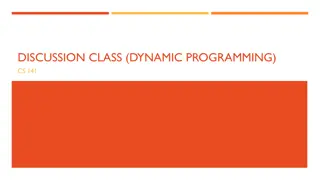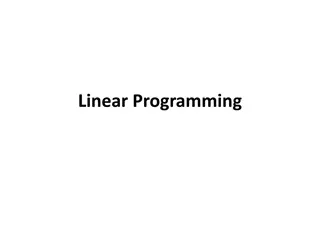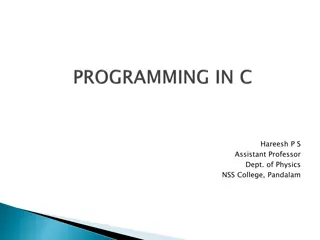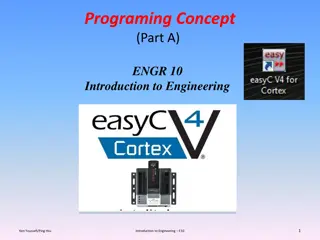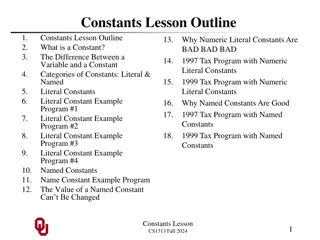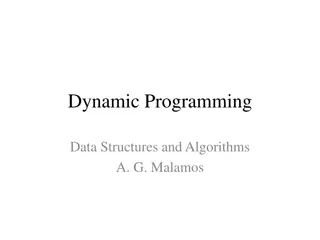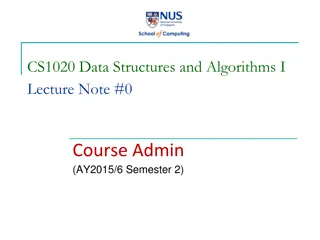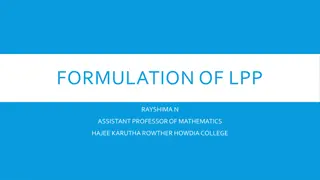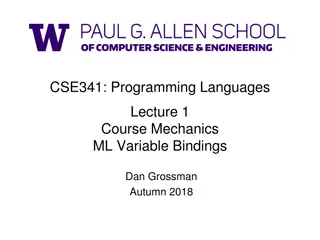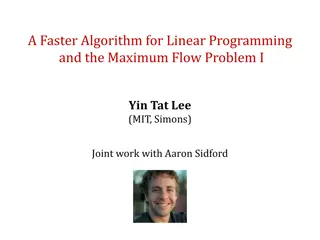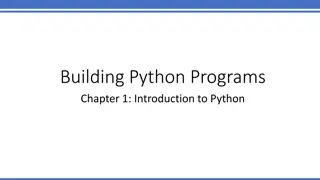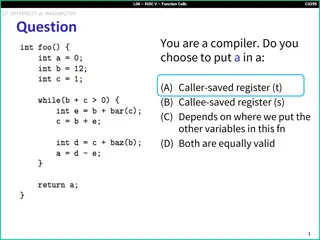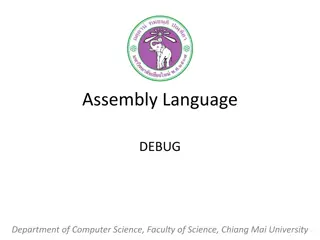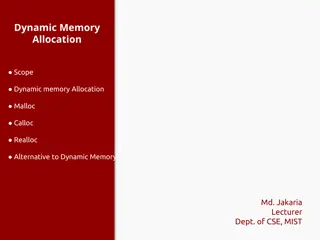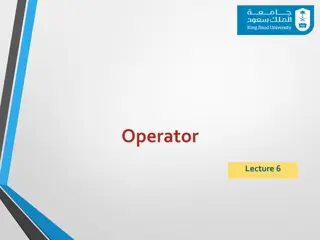Understanding Recursion in Programming
Recursion in programming involves a method calling itself to solve problems by breaking them down into simpler subproblems. The process requires a base condition, recursive calls, and progress towards termination. This technique is illustrated through examples like calculating factorials using recursive functions.
Uploaded on Sep 20, 2024 | 0 Views
Download Presentation

Please find below an Image/Link to download the presentation.
The content on the website is provided AS IS for your information and personal use only. It may not be sold, licensed, or shared on other websites without obtaining consent from the author. Download presentation by click this link. If you encounter any issues during the download, it is possible that the publisher has removed the file from their server.
E N D
Presentation Transcript
Module 4 - Part 2 Recursion
Factorial! 6! = 6*5*4*3*2*1
Factorial! 75! = ???
Factorial! 75! = 75*74!
Factorial! 75! = 75*74! Defined in terms of itself
Factorial! 75! = 75*74! To solve this problem, we need to figure out 74!
Factorial! 74! = 74*73! 75! = 75*74! To solve this problem, we need to figure out 73!
Factorial! 73! = 73*72! 74! = 74*73! 75! = 75*74! To solve this problem, we need to figure out 72! When would it stop?
Factorial! In general n! = n*(n-1)!
Recursion When a method calls itself Easy to identify Going to create clones of the function Usually, the clone has a smaller problem to work Requirements Must have the recursive call Must have a terminating condition Must make progress towards terminating
Recursion A recursive method works like this: If it s asked the simplest problem, it directly solves it. This is called the base condition/base case. If it s asked a more complex question it breaks that question into a slightly more simple problem and makes a recursive call to solve the simpler problem. Eventually
Recursive Technique Design First: Determine the base case, i.e. the stopping point for the recursion. It should normally be the simplest case. Second: What is the case that is just one step above it? Can it be generalized enough to fit?
Recursive Factorial Calculations A recursive declaration of the factorial method is arrived at by observing the following relationship: n! = n . (n 1)! What is the simplest case/ terminating state? you could use either 0! =1 or 1!=1 so
base case / stopping state public int factorial(int n) { if (n==1) return 1;
What if n == 2? 2! = 2 *1! which leads to the rest of the code: return n * factorial(n-1);
A recursive factorial method public int factorial(int n) { if(n==1) return 1; return n* factorial(n-1); } Let s trace it!
static int factorial (int n) { PRINT(n); if (n == 1) { return 1; } else { int result = n * factorial(n- 1); PRINT(n); return result; } } public void M/main (S/string[] args) { int f = factorial(4); PRINT(f); }
static int factorial (int n) { PRINT(n); if (n == 1) { return 1; } else { int result = n * factorial(n- 1); PRINT(n); return result; } } function stack public void M/main (S/string[] args) { int f = factorial(4); PRINT(f); }
static int factorial (int n) { PRINT(n); if (n == 1) { return 1; } else { int result = n * factorial(n- 1); PRINT(n); return result; } } public void M/main (S/string[] args) { int f = factorial(4); PRINT(f); } main f = factorial(4)
n == 4 static int factorial (int n) { PRINT(n); if (n == 1) { return 1; } else { int result = n * factorial(n- 1); PRINT(n); return result; } } public void M/main (S/string[] args) { int f = factorial(4); PRINT(f); } fact(4) main f = factorial(4)
n == 4 static int factorial (int n) { PRINT(n); if (n == 1) { return 1; } else { int result = n * factorial(n- 1); PRINT(n); return result; } } public void M/main (S/string[] args) { int f = factorial(4); PRINT(f); } fact(4) main f = factorial(4)
Output 4 n == 4 static int factorial (int n) { PRINT(n); if (n == 1) { return 1; } else { int result = n * factorial(n- 1); PRINT(n); return result; } } public void M/main (S/string[] args) { int f = factorial(4); PRINT(f); } fact(4) main f = factorial(4)
Output 4 n == 4 static int factorial (int n) { PRINT(n); if (n == 1) { return 1; } else { int result = n * factorial(n- 1); PRINT(n); return result; } } public void M/main (S/string[] args) { int f = factorial(4); PRINT(f); } fact(4) main f = factorial(4)
Output 4 n == 4 static int factorial (int n) { PRINT(n); if (n == 1) { return 1; } else { int result = n * factorial(n- 1); PRINT(n); return result; } } public void M/main (S/string[] args) { int f = factorial(4); PRINT(f); } fact(4) main f = factorial(4)
Output 4 n == 4 static int factorial (int n) { PRINT(n); if (n == 1) { return 1; } else { int result = n * factorial(n- 1); PRINT(n); return result; } } public void M/main (S/string[] args) { int f = factorial(4); PRINT(f); } result = 4 * factorial(3) fact(4) main f = factorial(4)
Output 4 n == 4 static int factorial (int n) { PRINT(n); if (n == 1) { return 1; } else { int result = n * factorial(n- 1); PRINT(n); return result; } } Pending Work! public void M/main (S/string[] args) { int f = factorial(4); PRINT(f); } result = 4 * factorial(3) fact(4) main f = factorial(4)
Output 4 n == 3 static int factorial (int n) { PRINT(n); if (n == 1) { return 1; } else { int result = n * factorial(n- 1); PRINT(n); return result; } } fact(3) public void M/main (S/string[] args) { int f = factorial(4); PRINT(f); } result = 4 * factorial(3) fact(4) main f = factorial(4)
Output 4 3 n == 3 static int factorial (int n) { PRINT(n); if (n == 1) { return 1; } else { int result = n * factorial(n- 1); PRINT(n); return result; } } fact(3) public void M/main (S/string[] args) { int f = factorial(4); PRINT(f); } result = 4 * factorial(3) fact(4) main f = factorial(4)
Output 4 3 n == 3 static int factorial (int n) { PRINT(n); if (n == 1) { return 1; } else { int result = n * factorial(n- 1); PRINT(n); return result; } } fact(3) public void M/main (S/string[] args) { int f = factorial(4); PRINT(f); } result = 4 * factorial(3) fact(4) main f = factorial(4)
Output 4 3 n == 3 static int factorial (int n) { PRINT(n); if (n == 1) { return 1; } else { int result = n * factorial(n- 1); PRINT(n); return result; } } fact(3) result = 3 * factorial(2) public void M/main (S/string[] args) { int f = factorial(4); PRINT(f); } result = 4 * factorial(3) fact(4) main f = factorial(4)
Output 4 3 n == 3 static int factorial (int n) { PRINT(n); if (n == 1) { return 1; } else { int result = n * factorial(n- 1); PRINT(n); return result; } } Pending Work! fact(3) result = 3 * factorial(2) public void M/main (S/string[] args) { int f = factorial(4); PRINT(f); } result = 4 * factorial(3) fact(4) main f = factorial(4)
Output 4 3 n == 2 static int factorial (int n) { PRINT(n); if (n == 1) { return 1; } else { int result = n * factorial(n- 1); PRINT(n); return result; } } fact(2) fact(3) result = 3 * factorial(2) public void M/main (S/string[] args) { int f = factorial(4); PRINT(f); } result = 4 * factorial(3) fact(4) main f = factorial(4)
Output 4 3 2 n == 2 static int factorial (int n) { PRINT(n); if (n == 1) { return 1; } else { int result = n * factorial(n- 1); PRINT(n); return result; } } fact(2) fact(3) result = 3 * factorial(2) public void M/main (S/string[] args) { int f = factorial(4); PRINT(f); } result = 4 * factorial(3) fact(4) main f = factorial(4)
Output 4 3 2 n == 2 static int factorial (int n) { PRINT(n); if (n == 1) { return 1; } else { int result = n * factorial(n- 1); PRINT(n); return result; } } fact(2) fact(3) result = 3 * factorial(2) public void M/main (S/string[] args) { int f = factorial(4); PRINT(f); } result = 4 * factorial(3) fact(4) main f = factorial(4)
Output 4 3 2 n == 2 static int factorial (int n) { PRINT(n); if (n == 1) { return 1; } else { int result = n * factorial(n- 1); PRINT(n); return result; } } fact(2) result = 2 * factorial(1) fact(3) result = 3 * factorial(2) public void M/main (S/string[] args) { int f = factorial(4); PRINT(f); } result = 4 * factorial(3) fact(4) main f = factorial(4)
Output 4 3 2 n == 2 static int factorial (int n) { PRINT(n); if (n == 1) { return 1; } else { int result = n * factorial(n- 1); PRINT(n); return result; } } Pending Work! fact(2) result = 2 * factorial(1) fact(3) result = 3 * factorial(2) public void M/main (S/string[] args) { int f = factorial(4); PRINT(f); } result = 4 * factorial(3) fact(4) main f = factorial(4)
Output 4 3 2 n == 1 static int factorial (int n) { PRINT(n); if (n == 1) { return 1; } else { int result = n * factorial(n- 1); PRINT(n); return result; } } fact(1) fact(2) result = 2 * factorial(1) fact(3) result = 3 * factorial(2) public void M/main (S/string[] args) { int f = factorial(4); PRINT(f); } result = 4 * factorial(3) fact(4) main f = factorial(4)
Output 4 3 2 1 n == 1 static int factorial (int n) { PRINT(n); if (n == 1) { return 1; } else { int result = n * factorial(n- 1); PRINT(n); return result; } } fact(1) fact(2) result = 2 * factorial(1) fact(3) result = 3 * factorial(2) public void M/main (S/string[] args) { int f = factorial(4); PRINT(f); } result = 4 * factorial(3) fact(4) main f = factorial(4)
Output 4 3 2 1 n == 1 static int factorial (int n) { PRINT(n); if (n == 1) { return 1; } else { int result = n * factorial(n- 1); PRINT(n); return result; } } fact(1) fact(2) result = 2 * factorial(1) fact(3) result = 3 * factorial(2) public void M/main (S/string[] args) { int f = factorial(4); PRINT(f); } result = 4 * factorial(3) fact(4) main f = factorial(4)
Output 4 3 2 1 We terminated n == 1 static int factorial (int n) { PRINT(n); if (n == 1) { return 1; } else { int result = n * factorial(n- 1); PRINT(n); return result; } } fact(1) return 1 fact(2) result = 2 * factorial(1) fact(3) result = 3 * factorial(2) public void M/main (S/string[] args) { int f = factorial(4); PRINT(f); } result = 4 * factorial(3) fact(4) main f = factorial(4)
Output 4 3 2 1 Collapse the stack static int factorial (int n) { PRINT(n); if (n == 1) { return 1; } else { int result = n * factorial(n- 1); PRINT(n); return result; } } fact(1) return 1 fact(2) result = 2 * factorial(1) fact(3) result = 3 * factorial(2) public void M/main (S/string[] args) { int f = factorial(4); PRINT(f); } result = 4 * factorial(3) fact(4) main f = factorial(4)
Output 4 3 2 1 Collapse the stack static int factorial (int n) { PRINT(n); if (n == 1) { return 1; } else { int result = n * factorial(n- 1); PRINT(n); return result; } } fact(1) return 1 fact(2) result = 2 * factorial(1) fact(3) result = 3 * factorial(2) public void M/main (S/string[] args) { int f = factorial(4); PRINT(f); } result = 4 * factorial(3) fact(4) main f = factorial(4)
Output 4 3 2 1 Collapse the stack n == 2 static int factorial (int n) { PRINT(n); if (n == 1) { return 1; } else { int result = n * factorial(n- 1); PRINT(n); return result; } } fact(2) result = 2 * 1 fact(3) result = 3 * factorial(2) public void M/main (S/string[] args) { int f = factorial(4); PRINT(f); } result = 4 * factorial(3) fact(4) main f = factorial(4)
Output 4 3 2 1 2 Collapse the stack n == 2 static int factorial (int n) { PRINT(n); if (n == 1) { return 1; } else { int result = n * factorial(n- 1); PRINT(n); return result; } } fact(2) result = 2 * 1 = 2 fact(3) result = 3 * factorial(2) public void M/main (S/string[] args) { int f = factorial(4); PRINT(f); } result = 4 * factorial(3) fact(4) main f = factorial(4)
Output 4 3 2 1 2 Collapse the stack n == 2 static int factorial (int n) { PRINT(n); if (n == 1) { return 1; } else { int result = n * factorial(n- 1); PRINT(n); return result; } } fact(2) result = 2 * 1 = 2 fact(3) result = 3 * factorial(2) public void M/main (S/string[] args) { int f = factorial(4); PRINT(f); } result = 4 * factorial(3) fact(4) main f = factorial(4)
Output 4 3 2 1 2 Collapse the stack n == 2 static int factorial (int n) { PRINT(n); if (n == 1) { return 1; } else { int result = n * factorial(n- 1); PRINT(n); return result; } } fact(2) result = 2 * 1 = 2 fact(3) result = 3 * factorial(2) public void M/main (S/string[] args) { int f = factorial(4); PRINT(f); } result = 4 * factorial(3) fact(4) main f = factorial(4)
Output 4 3 2 1 2 Collapse the stack n == 2 static int factorial (int n) { PRINT(n); if (n == 1) { return 1; } else { int result = n * factorial(n- 1); PRINT(n); return result; } } fact(2) result = 2 * 1 = 2 fact(3) result = 3 * factorial(2) public void M/main (S/string[] args) { int f = factorial(4); PRINT(f); } result = 4 * factorial(3) fact(4) main f = factorial(4)
Output 4 3 2 1 2 Collapse the stack n == 3 static int factorial (int n) { PRINT(n); if (n == 1) { return 1; } else { int result = n * factorial(n- 1); PRINT(n); return result; } } fact(3) result = 3 * 2 = 6 public void M/main (S/string[] args) { int f = factorial(4); PRINT(f); } result = 4 * factorial(3) fact(4) main f = factorial(4)
Output 4 3 2 1 2 3 Collapse the stack n == 3 static int factorial (int n) { PRINT(n); if (n == 1) { return 1; } else { int result = n * factorial(n- 1); PRINT(n); return result; } } fact(3) result = 3 * 2 = 6 public void M/main (S/string[] args) { int f = factorial(4); PRINT(f); } result = 4 * factorial(3) fact(4) main f = factorial(4)
Output 4 3 2 1 2 3 Collapse the stack n == 3 static int factorial (int n) { PRINT(n); if (n == 1) { return 1; } else { int result = n * factorial(n- 1); PRINT(n); return result; } } fact(3) result = 3 * 2 = 6 public void M/main (S/string[] args) { int f = factorial(4); PRINT(f); } result = 4 * factorial(3) fact(4) main f = factorial(4)
